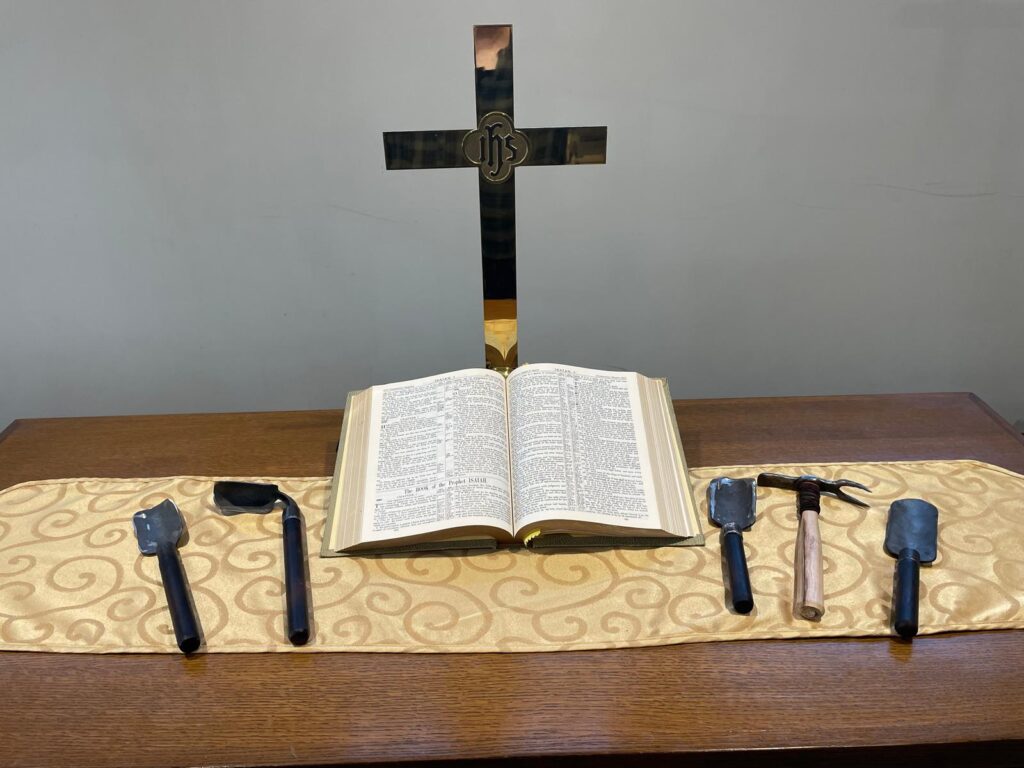Diaconic Ecumenical Chaplaincy Initiative (CTdeM)
Click here to see the latest update
The Theological Community of Mexico (“TCM”) was founded in 1964 as a consortium of seminaries from different Christian traditions that share their academic and ministerial resources. Today five theological seminaries from Mexican Anglican, Baptist, Lutheran, Methodist and Presbyterian denominations, and one Mexican non-profit organization make up the Theological Community of Mexico.
After several decades of a diaconal, ecumenical and pastoral accompaniment of communities and situations in conflict, TCM is further developing its Chaplaincy Program to provide counseling on human rights and conflict resolution for peace with justice and dignity in Mexico. This program provides a pastoral presence through chaplains in university, prisons and other institutional settings, seeking to make available pastoral counseling to every person needing to talk, and feel accompanied, in need of consolation and strengthening, as well as to sort out crucial things with a chaplain during stressful moments in their lives. People can talk to a chaplain when they need help in dealing with grief or for comfort and guidance while reflecting on issues and making decisions in an environment of confidentiality and with an absence of prejudice. Chaplaincy helps people to explore the deep questions of life but also ways to discern God´s will in their lives. Chaplains serve to guide people in relation to their own religious and faith traditions and to explore deep questions about existence, where there may be no clue about how to begin the walk.
TCM has brought its resources to the families as well as friends and fellow students of 43 university students who were detained by Municipal Police in Ayotzinapa, in the Mexican state of Guerrero, and have disappeared without any trace. A CTM ministry of Chaplaincy was created to help. This Chaplaincy Initiative also provides for the spiritual and material care for families and related people to previous human rights and violence crises (Ciudad Juarez, Acteal and Chiapas, among others).
The people involved in these situations are mostly poor families from rural areas, women, and children and the chaplaincy program includes:
- All who require accompaniment, care and attention to special needs
- People in jails and hospitals, related or not to the previous targeted populations
- Chaplains themselves, as they will be living experiences of solidarity that will help them to define their ministerial vocations and to be better pastors, counselors, and Christian people
The program anticipates serving approximately 500 persons in direct care and accompaniment per year; approximately 2,000 persons who are part of the circle of relations with the 500; and communities and groups within civil society in an indirect way, as they will participate in concrete ways in the Chaplaincy Initiative through being part of the liturgies, the messages, the materials and the presence of the Chaplaincy Initiative.
The TCM Chaplaincy Initiative hopes to:
- Stimulate reflection and analysis of Mexican and Latin American social reality in the light of Christian faith in an ecumenical context within the Theological Community of Mexico.
- Promote an adequate environment for the development, personal growth, social and spiritual well-being of the community and society in general through pastoral and spiritual accompaniment.
- Encourage the development of attitudes and Christian values in an academic and ecumenical context, promoting fellowship, solidarity and service to others in a process of humanization of Mexican, Latin American and Caribbean people.
- Foster advocacy initiatives for the defense of human rights of persons that are victims of violence in Mexico from a spiritual perspective.
These objectives will be accomplished by offering services through personal and/or group interviews for the personal and spiritual accompaniment of people as they request it, within a spirit of openness, absolute confidentiality and non-discrimination. Chaplaincy services will be offered by an Ecumenical Chaplain and by Denominational Chaplains. They will provide liturgies, prayer and meditation time, according to the needs of the people, particularly to social movement leaders and participants. Cultural and academic activities will provide a place of reflection about the present crisis and a linkage with other organizations, developing agreements between institutions for a pluralistic dialogue within Mexican society. TCM will also include a course on “Introduction to Studies on Peace and Conflict Resolution.” Three workshops for church leaders will be organized with the theme: “Christian Action for a Peacebuilding Diaconia.” Marches, caravans, and displacements of civil society will be accompanied by Chaplains in their claim for peace, justice, and dignity in Mexico. Five National Workshops will be organized for the promotion of a Popular and Citizens Constitution for Mexico. An evaluation in each semester will be conducted to see the incidence of Chaplaincy services and the ways to improve the initiative.
Update: November 2018
On September 19, 2017 Mexico experienced a 7.1 magnitude earthquake that struck the states of Puebla, Morelos, and Mexico City. The death toll reached 370, 6,000 individuals were injured, and many buildings collapsed in the tremors. Many lost their homes. The Theological Community of Mexico (TCM) and the Diaconal Ecumenical Chaplaincy Initiative (DECI) created channels to provide immediate assistance through five primary objectives:
- Provide food to 1,000 affected households during the first 144 hours
- Assist 200 families with hygiene and chlorine kits for water sanitation
- Improve sleep conditions for 200 households by delivering sheets and mattresses
- Provide training for humanitarian disaster responders
- Construct temporary shelters, community kitchens, and bathrooms.
To fulfill these objectives, students, professors, chaplains, and others affiliated with TCM, gathered to design a strategy to perform the following activities:
- From the first moment, TCM supported rescue operations for people trapped throughout the city, especially in Coyoacán,
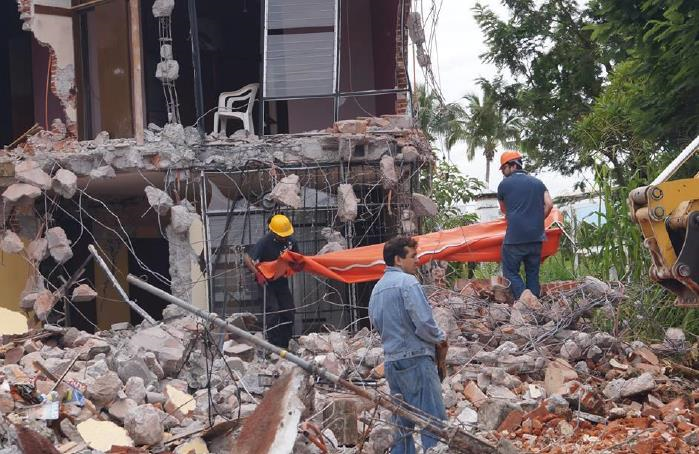 Mexico City.
Mexico City. - TCM opened its chapel to use as a collection center where groceries would be distributed to victims.
- TCM students and staff began supporting earthquake debris removal.
- DECI initiated a process of psychosocial spiritual accompaniment to victims.
- Over 12 tons of food were delivered in affected areas.
- A large group of volunteers deployed to remove debris at a building in Mexico.
- Staff visited a fellow member, Reverend Hugo Gallardo, and his neighbors, whose apartment building had collapsed.
- Representatives visited a devastated area called Joquicingo de León Guzman, where 80% of the houses were damaged, along with a Catholic church and a Presbyterian church.
- The TCM Executive Committee met to affirm the creation of the Disaster Assistance Program in order to have more coordinated activities networked with other ecclesiastical, ecumenical, and civil society organizations.
- DECI reported that it had provided many with psychosocial spiritual support throughout the city.
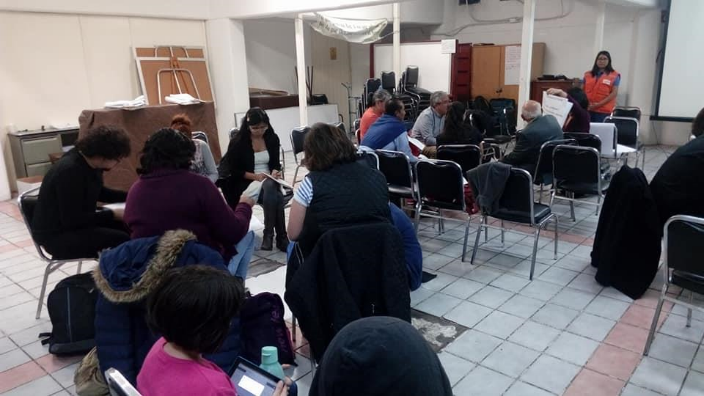 In the first 144 hours after the earthquake, TCM provided 12 tons of food, tools to remove rubble, clothing, hygiene items, blankets, and mattresses for 1,500 families. TCM provided accommodations to the National Youth Institute Orchestra due to the loss of their building. TCM organized a disaster risk-management workshop for 40 Mexican participants, including the entire TCM team and representatives from the Methodist Church of Mexico. DECI organized a psychosocial spiritual support workshop, which provided specialized psychotherapy to 25 earthquake responders. Systematized emergency relief continued for the last three months of 2017 under the leadership of Reverend Hugo Gallardo. During this time, 200 seriously affected families in five communities received 1,000 mattresses, 2,000 blankets, health services, purified water, hygiene products, provisional survival infrastructure, and 45 tons of food.
In the first 144 hours after the earthquake, TCM provided 12 tons of food, tools to remove rubble, clothing, hygiene items, blankets, and mattresses for 1,500 families. TCM provided accommodations to the National Youth Institute Orchestra due to the loss of their building. TCM organized a disaster risk-management workshop for 40 Mexican participants, including the entire TCM team and representatives from the Methodist Church of Mexico. DECI organized a psychosocial spiritual support workshop, which provided specialized psychotherapy to 25 earthquake responders. Systematized emergency relief continued for the last three months of 2017 under the leadership of Reverend Hugo Gallardo. During this time, 200 seriously affected families in five communities received 1,000 mattresses, 2,000 blankets, health services, purified water, hygiene products, provisional survival infrastructure, and 45 tons of food.
Update: December 2020
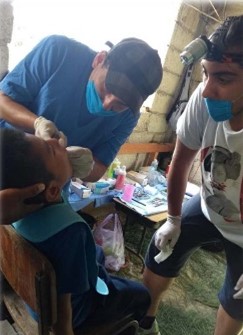
Since a 7.1 magnitude earthquake struck Mexico in 2018, TCM has been busy providing direct assistance to the most vulnerable members of society. Immediately after the disaster, TCM mobilized to provide food, sanitation kits, bedding, shelter, and training to help get communities get back on their feet as soon as possible. Although the earthquake occurred two years ago, the challenges it has created remain. TCM has continued to walk alongside those affected, as well as explore new tactics and opportunities for seeking peace with justice in Mexico.
In the two years since the earthquake, TCM has been responding to new challenges. One area includes working with migrants from Central America. These travelers have been vulnerable and in need of essential services and support. TCM provides accompaniment, direct assistance, and legal advice. In one year, TCM accompanied over 6,000 migrants as they passed through Mexico City.
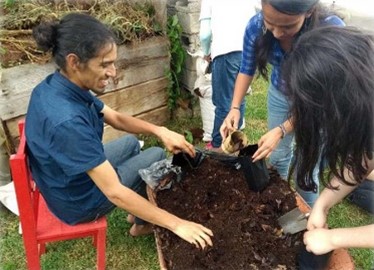
This year, the COVID-19 pandemic has affected communities globally and has complicated TCM programs. Many people have been affected by this pandemic, grieving the loss of loved ones, and confronted with unemployment, and a declining economy. In light of this, TCM has found creative ways to generate spaces for support and training on the topics of trauma, social confinement, and public health. More than 10,000 people have participated in these virtual events. In the coming years, TCM hopes to continue and to expand these ministries. In the coming years, TCM plans to continue to offer accompaniment while promoting unity in the diversity through expressions of faith and worship.
Support this Ministry
To make a gift for this ministry online or by check use the online donation page.
- 100% of your gift will be directed to Diaconic Ecumenical Chaplaincy Initiative (CTdeM)
- You will receive updates on the work in this area as they become available
- Share in the vision of God’s abundant life for all people
Related Content
They Will Pound Their Swords into Rakes
A mission co-worker’s journey through hospitality, faith, and a garden where peace takes root...
Read MoreGlobal Ministries is saddened to learn of the death of Rev. Virginia Ruth Kennedy Bergfalk
Global Ministries is saddened to learn of the death of Rev. Virginia Ruth Kennedy Bergfalk. ...
Read MoreGlobal Ministries is Saddened to Learn of the Death of Rev. Gustav Henry “Gus” Kuether
Global Ministries is saddened to share the news of the passing of Rev. Gustav Henry "Gus" Kuether...
Read More
